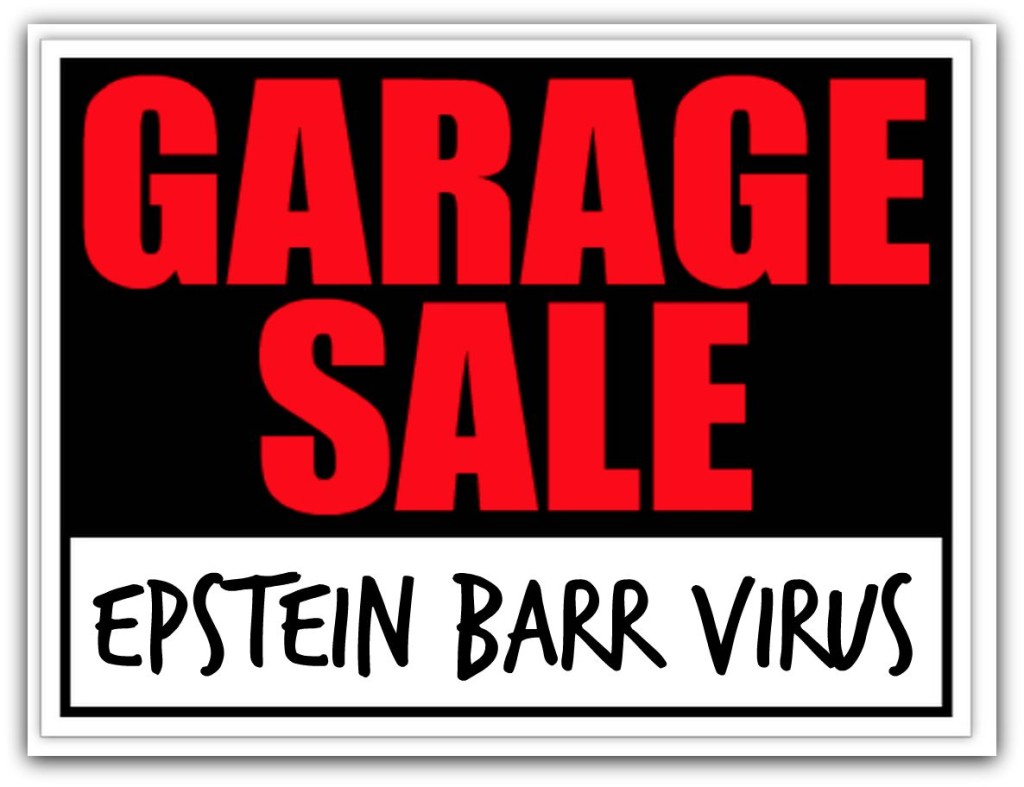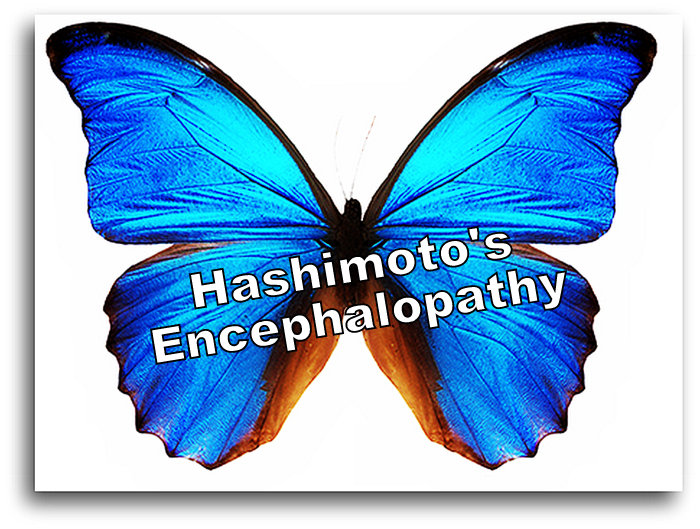Why you, as a hypothyroid patient, need to be aware of the Epstein Barr Virus
Though this blog post was originally written in 2010, it has been updated to the present day and time, making it current.  Enjoy!
This past Saturday, while browsing at the next-to-last garage sale (one of my favorite Saturday morning events), my ears perked up like a bunny when I heard a gal chatting with the owner of the house.
I heard things like “sick for 5 years…fibromyalgia…a lot of pain all over my body…had to quit my job and live with my parents…in bed for two years…they had to bath me...” and more miserable images of something she was clearly glad to be over.
So, while my husband sat in the car with the patience of a saint, I lingered. When she finished chatting and was heading to her car, I walked towards her and said gingerly “I overheard your conversation. Can I ask you about the fibromyalgia and your experience??” I couldn’t help myself.
As a Thyroid Patient Activist who has stood up to the inane allopathic failure in the diagnosis and treatment of hypothyroidism, I knew that the majority of cases of “fibromyalgia” were due to undiagnosed or poorly treatment hypothyroidism, as well as the accompanying hell of adrenal fatigue, thanks to the garbage can TSH lab test or the inadequate treatment of T4-only treatment like Synthroid.  Yet, here was a young woman, Mel, who was now the picture of health. What was her story??
Mel’s story was a tale of sudden onset followed by five years of misery, all over body pain, Â immense fatigue, utter helplessness, debilitation, and neck lymph nodes SO swollen that they looked like two huge goiters–right and left. It was also a scenario of no firm diagnoses, yet no hesitation by doctors to make stabs– from fibromyalgia to an unknown chronic fatigue disorder.
But I knew right away what she probably had: acute Epstein Barr Virus (EBV) reactivation.
I knew because I had the exact same malady which once took away more than a year of my life (as compared to Mel’s horrific five years). Â And like her, with the use of meditation (and in my case, intense imagery and homeopathics), I got well as if it never happened.
And we also shared a reason why the EBV virus became activated in our bodies in the first place: STRESS.  For Mel, it appeared to have nothing to do with anything thyroid-related, but an extremely stressful helping-vocation that was eating her alive. For me, it was the stress of having to be where I didn’t want to be, feeling overtly powerless…and on top of being on the lousy Synthroid.
And for thyroid patients all over the world, including you, the risk of reactivation of the Epstein Barr Virus is a constant threat.
Reactivated EBV can result from one or more of the following biological stresses:
- being undiagnosed thanks to the inadequate TSH lab test
- being on a T4 medication like Synthroid, Levoxyl, Levothyroxine, Eltroxin, Oroxine, etc
- falling into low cortisol from adrenal fatigue
- having chronic side issues pulling your body down such as gluten intolerance or celiac, low iron, poor digestion, or making mistakes in your treatment
Even worse, add life’s stresses as icing on the cake, and you’re a sitting duck for the risk of reactivated EBV.
What is EBV?
Epstein Barr Virus,  also called human herpesvirus 4 ( HHV-4) is an opportunistic virus that actually lies dormant in at least 95% of all adults over their 30’s. It’s what causes mononucleosis, aka “mono”, as a teenager,  but you don’t have to have had mono to carry the dormant virus. Wikipedia states that it also probably has a primary role in many autoimmune diseases, including ” dermatomyositis, systemic lupus erythematosus, rheumatoid arthritis, Sjogren’s syndrome, and multiple sclerosis.” i.e. this is one nasty virus!
Why do so many thyroid patients find themselves with reactivated EBV?
Millions of thyroid patients live their lives compromised due to being on T4-only meds like Synthroid, Levoxyl, levothyroxine, Eltroxin, Oroxine, and other T4 med brands. Â Additionally, patients find themselves with poorly functioning adrenals, poor digestion and other conditions related to a poor treatment–all adding to a lowered immune system, which allows the opportunistic EBV virus to take ahold, especially in the face of extreme or chronic life stress.
What are symptoms of a reactivated EBV?
It can vary from patient-to-patient, but can include easy and excess fatigue, achiness, joint pain, all over body pain, swollen lymph nodes, slight fever, ringing in the ears, and a general I-don’t-feel-well–the latter all the more so after activity. When my EBV antibodies were acute, I would be in bed for 2-3 days after pulling weeds for just twenty minutes while seated. Â I couldn’t grocery shop; I couldn’t do housework. Nothing. Nada. I also had constant ringing in the ears and achiness.
How do I find out if I have reactivated EBV??
Ask your doctor to send you to a lab to be tested for it, and be sure you clarify that you are not asking for tests that show you were exposed it (most of us have). Instead you are asking for the testing which shows it has reactivated. Â Or you can order it yourself via the labs I have listed here.
How do I treat it??
It’s not easy. I personally benefitted from taking a prescribed anti-virus medication. Though that lessened my symptoms by 50%, it wasn’t enough. I then moved to homeopathic medications and some dedicated mental imagery to finally get rid of it, as well as lots of rest and the immune enhancing support of vitamins, minerals, supplements plus healthy strategies i.e. whatever it takes to nourish your immune system. Nourishing supplements include high dose Vit. C (2000 mg minimum), Â Vit E as mixed tocopherals, Â selenium (200 – 400 mcg), mushroom extracts, CoQ10, high dose B-vitamins, minerals plus plenty of healthy and raw foods. Â There are also great natural anti-virals I would recommend exploring. And ultimately as a thyroid patient, being on a MUCH better hypothyroid treatment with natural desiccated thyroid is the key, besides treating one’s adrenal issues, gluten or digestive issues, low iron, and all other related conditions.
Bottom line, once you are adequately treating your thyroid problem (see the current Options for Thyroid Treatment), addressing potential adrenal fatigue, low ferritin, gluten issues, low B12, for example, and using good stress management in the face of pressures within your life, your risk of having a reactivation of the dormant EBV virus is very low.
I’ve read that most all cases of hypothyroidism are due to EBV?
Not according to the experiences and intelligence of thyroid patients worldwide. Yes, there is some evidence that having reactivated herpes viruses like EBV could contribute to a hypothyroid state. But it’s rare, and is only one of many causes of hypothyroidism, not “the” cause. Far more common are genetic causes (numerous genes have been identified), as well as the well-researched organ-targeted autoimmune cause of Hashimoto’s. See this page. There are also studies that consistently show that reactivated EBV does not trigger Hashimoto’s or Grave’s–the latter also falsely stated.
Want more detailed information on EBV? Order the STTM ebook and become informed!
*** Have you Liked the STTM Facebook page? It gives you daily tips, information and inspiration!






